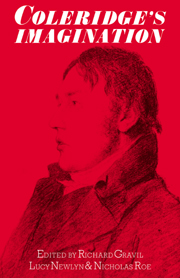Book contents
- Frontmatter
- Contents
- Pete Laver: a memoir
- Abbreviations
- Introduction
- Romantic imagination, nature and the pastoral ideal
- ‘The infinite I AM’: Coleridge and the Ascent of being
- Struggling with the contingent: self-conscious imagination in Coleridge's notebooks
- Coleridge's rejection of nature and the natural man
- The imagination of Mrs Samuel Taylor Coleridge: unknown inspiration of an unknown tongue
- ‘As much diversity as the heart that trembles’: Coleridge's notes on the lakeland fells
- ‘Leaping and lingering’: Coleridge's lyrical ballads
- ‘Radical Difference’: Coleridge and Wordsworth, 1802
- Imagining Wordsworth: 1797–1807–1817
- The Otway connection
- Imagining Robespierre
- Coleridge's Dejection: imagination, joy and the power of love
- Imagining naming shaping: stanza VI of Dejection: an Ode
- Mythopoesis: the unity of Christabel
- The languages of Kubla Khan
- Notes on the contributors
- Index
Coleridge's Dejection: imagination, joy and the power of love
Published online by Cambridge University Press: 04 August 2010
- Frontmatter
- Contents
- Pete Laver: a memoir
- Abbreviations
- Introduction
- Romantic imagination, nature and the pastoral ideal
- ‘The infinite I AM’: Coleridge and the Ascent of being
- Struggling with the contingent: self-conscious imagination in Coleridge's notebooks
- Coleridge's rejection of nature and the natural man
- The imagination of Mrs Samuel Taylor Coleridge: unknown inspiration of an unknown tongue
- ‘As much diversity as the heart that trembles’: Coleridge's notes on the lakeland fells
- ‘Leaping and lingering’: Coleridge's lyrical ballads
- ‘Radical Difference’: Coleridge and Wordsworth, 1802
- Imagining Wordsworth: 1797–1807–1817
- The Otway connection
- Imagining Robespierre
- Coleridge's Dejection: imagination, joy and the power of love
- Imagining naming shaping: stanza VI of Dejection: an Ode
- Mythopoesis: the unity of Christabel
- The languages of Kubla Khan
- Notes on the contributors
- Index
Summary
Poetic origins are often obscure, as witness the genesis of Shakespeare's sonnets or the history of Keats’ two Hyperions. Among such mysteries, the relationship between Coleridge's verse ‘Letter to Sara Hutchinson’ (written on 4 April 1802, but first published only in 1937) and his Dejection: an Ode (published in the Morning Post, 4 October 1802, Wordsworth's wedding-day) has been a matter of considerable discussion and debate. Although it is evident that the one is a drastic revision of the other, it remains unclear what were Coleridge's poetic purposes in making the revision, and what was in his mind in publishing it on the wedding-day of his friend Wordsworth, which was also the seventh anniversary of his own unfortunate marriage to Sara Fricker.
A cogent case has been made that ‘Dejection’ has its origin as much in Coleridge's relationship with Wordsworth as in his frustrated love for Sara Hutchinson. The first four stanzas of Wordsworth's ‘Immortality Ode’, in which Wordsworth laments his loss of the ‘visionary gleam’, were written just days before Coleridge composed his verse-letter to Sara, and it was two years before Wordsworth was able to complete it. Written as they are on what appears to be a similar theme, it is difficult not to see the two poems as ‘in some sense in a dialogue with each other’.
- Type
- Chapter
- Information
- Coleridge's ImaginationEssays in Memory of Pete Laver, pp. 179 - 192Publisher: Cambridge University PressPrint publication year: 1985



